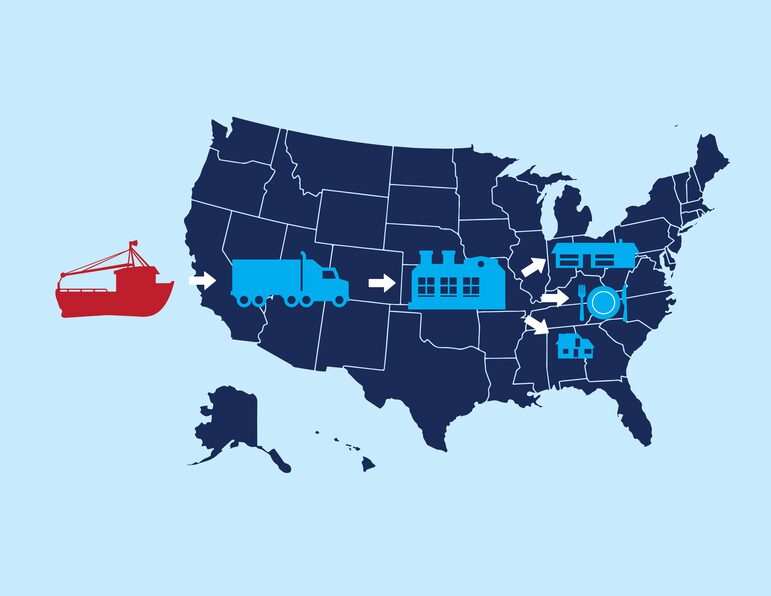December 22, 2022
VICTORY: FDA issues new requirements for seafood traceability
BY: Sarah Holcomb
How do you know if the seafood at your local market is correctly labeled? Often consumers can’t know for sure. In the United States, up to 85% of seafood is imported, according to NOAA Fisheries, and only 40% of this seafood is required to have documentation that shows where it was caught or even which specific species it is. An Oceana study found that at least one-third of seafood sampled across the U.S. was mislabeled. Mislabeling is especially common for expensive species; red snapper, for example, is sometimes substituted with less expensive snappers or other fish like tilapia.
Seafood fraud, which can occur at any point in the supply chain, cheats consumers and exposes them to potential health risks. Extremely sensitive to proper handling and refrigeration, seafood can cause severe illness if not handled correctly. Every year, around 260,000 people in the U.S. get sick from contaminated fish. Without tracking the seafood from the fishing boat or farm to the dinner plate, illegally caught seafood can gain a new identity, labeled as legal catch. Seafood traceability helps ensure that all seafood sold in the U.S. is safe, legally caught, and honestly labeled.
After years of campaigning from Oceana and our allies, the Food and Drug Administration (FDA) has issued a final rule that will require traceability for high risk foods, including most seafood. This is the missing link to allow for seafood to be traced through the supply chain, from boat to plate.
THE GOAL
Oceana has long campaigned for seafood traceability to help fight seafood fraud and keep illegally caught fish out of the U.S. market and protect consumers by ensuring every fish sold in the U.S. is safe, legally caught, responsibly sourced, and honestly labeled.
THE CAMPAIGN
Since 2011, Oceana has worked to stop seafood fraud in the United States. In 2014, President Obama created a Presidential Task Force on Combating Illegal, Unreported and Unregulated Fishing and Seafood Fraud that developed a suite of recommendations, including seafood traceability. Oceana released a report in 2016 detailing the global scale of seafood fraud following numerous Oceana investigations of seafood fraud in the U.S., finding that on average, one in five of more than 25,000 samples of seafood tested worldwide was mislabeled.
Later that year, the Obama administration established the Seafood Import Monitoring Program (SIMP) to address illegal fishing and seafood fraud in the U.S by requiring catch documentation and traceability for some seafood imports. However, the rule covered only applied to 13 types of imported fish (40% of U.S. seafood imports) and only traced them from the boat or farm to the U.S. border.
Oceana continues to campaign to expand SIMP to all imported seafood and trace seafood through the full supply chain. Earlier this year, Oceana highlighted four species not covered by SIMP, each of which are impacted by the illegal seafood trade and are vital to communities around the world. In addition to conducting extensive seafood testing and reporting, Oceana has routinely met with key stakeholders and secured support from members of Congress as well as from 17,000+ supporters who signed the campaign’s petition.

The FDA final rule requires traceability of high-risk foods, including most seafood, past the point of landing all the way to the final point of sale.
THE VICTORY
In November, the FDA issued a final rule, which requires traceability of high-risk foods including most seafood. Now businesses must track most seafood from the point of landing, through the supply chain, to the final point of sale.
WHY IT MATTERS
As much as 30% of worldwide marine catch is illegally caught or not reported. Illegal, unreported, and unregulated (IUU) fishing threatens the world’s oceans: it depletes marine resources, destroys habitats, and is explicitly linked to forced labor and human rights abuses. In 2019 alone, the U.S. imported an estimated $2.4 billion worth of seafood caught from IUU fishing.
With over 2,000 different species of seafood from around world for sale in the U.S., it isn’t realistic to expect American consumers to figure out what fish is really being served. Seafood fraud makes it more difficult for consumers to make informed decisions for sustainability, health, or other reasons.
In January 2021, Oceana released the results of a nationwide poll showing that Americans overwhelmingly support policies to end illegal fishing and seafood fraud. Oceana is campaigning to ensure that U.S. dollars do not continue supporting these illicit activities at sea by closing the U.S. market to illegally sourced seafood.
The new FDA traceability rule, paired with the requirements for seafood imports from NOAA, means that seafood covered by both of these programs can be traced from the fishing boat to the dinner plate. Oceana encourages President Biden to expand both programs to all seafood sold in the United States.



